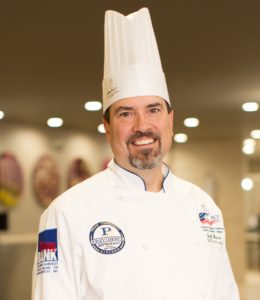National Culinary Arts Month in July recognizes the professional cooks and chefs who bring innovative, and unique cuisine from their kitchens to our tables. Green Energy Biofuel will talk with some of our great chefs to bring attention to their unique styles and environmental focus.
By Stephan Caldwell, 07/16/2020
Second Harvest Food Bank, Winston-Salem NC
Jeff Bacon is a Certified Executive Chef and cookbook author from Winston-Salem, NC. He is also a Certified Culinary Administrator and member of the American Academy of Chefs. He has worked in the foodservice industry for 36 years.
In his current position at Second Harvest Food Bank of NWNC, Chef Jeff oversees the Providence family of programs. Since founding this effort in 2006, Bacon has fostered Providence into the tip of the spear in Second Harvest Food Bank’s efforts to combat the root causes of poverty and hunger.
of NWNC, Chef Jeff oversees the Providence family of programs. Since founding this effort in 2006, Bacon has fostered Providence into the tip of the spear in Second Harvest Food Bank’s efforts to combat the root causes of poverty and hunger.
Anchored by its school, Providence Culinary Training, students work in the Providence Community Meals department to provide meals to hungry children, seniors and other individuals who struggle to provide nourishment for themselves and their families. After learning a wide array of culinary and life skills, these students go on to employment in the greater culinary community in the Triad of North Carolina (PCT boasts an 85% one-year job retention rate). Select graduates can apply to enroll in the Hospitality Residency Program at one of Providence’s social enterprise businesses: Providence Catering, Providence Restaurant, or Providence Kitchen (which houses a Barista Training Program). Lasting 24 months, this residency allows graduates of Providence Culinary Training to earn above-market rate wages while developing more advanced skills and receiving mentoring and access to wrap-around services through Providence’s department of Client Advocacy. 100% of those completing the Residency obtain wages above the NC self-sufficiency rate.
Providence is an American Culinary Federation Quality Program and belongs to the training offerings of both Forsyth Technical Community College and Goodwill of NWNC. Providence was selected as 2013 Sustainable Not for Profit of the Year. Chef Jeff is a two-time recipient of the American Culinary Federation President’s Medallion (one of only 6 people since 1929 to receive this honor more than once) was given the UNC-G Public Service Award in 2018, was awarded Triad Local First’s “Vibrancy Award” in 2015, and was selected for the Winston Salem Foundation Award in 2017, the highest award for non-profit service in the city.
Jeff believes in his totality that he is fulfilling God’s calling upon his life after a redemptive transformation of his own. He has assisted other programs in their efforts to start or grow from Colorado to Massachusetts to Florida. In his effort to globally assist others to lift individuals in their communities, he serves as a National Member Ambassador for Catalyst Kitchens and on the National Job Training Cohort for Feeding America.
Q: What is your philosophy of cooking?
A: The Most Good You Can Do With a Fork – I believe that cooking has a purpose, and in our work, at Providence, we are teaching and giving folks a new career path, we are networking with local farmers and producers to support and educate about our food system, we are advocating for justice and equity in the workplace. Its all connected and if done right, delicious!
Q: What is your favorite food to fry?
A: I have lived in the South for 51 years so we fry everything! I love to fry Arancini which are breaded and fried risotto balls. You can tuck all kinds of tasty surprises inside, salumi, cheese veggies and I love the texture contrast of crunchy exterior and creamy soft interior.
Q: Do you have a certain type of cooking oil you like to use when you fry?
A: Depends on the application. For general purpose deep frying, I love using peanut oil. There are obvious issues with this because of allergens so we usually use a non-trans fat vegetable fryer oil. For French fries, I love to fry in duck fat, and for tempura and Asian applications, I love to use coconut oil.
Q: Why is recycling used cooking oil important to you?
A: All sustainable practices are important to me. The more we take care of the resources we use the more they will be available and affordable in the future.
